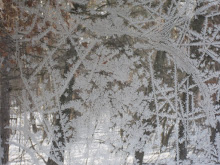Tuesday, February 25, 2014
Can we survive under capitalism?
I was
glad to see an instructor from Naugatuck Valley Community College,
Waterbury, Connecticut, Leonard Yannielli, publish this on the internet
as part of what he wrote on the environment:
The single greatest global problem and threat to the environment is war and war preparations. Agent Orange use in the U.S. War in Vietnam killed an area the size of Massachusetts. Genetic damage among ensuing generations has occurred among the Vietnamese.
The burning of the oil fields during Iraq War I is a more recent example. Both Iraqi and U.S. forces suffered the respiratory consequences. No one entity uses more nonrenewal resources than the U.S. Military. All these examples may pale in face of the dangers of spent radioactive material that spew radiation for 1,000s of years.
The explanation of war and its extreme environmental consequences are to be found in the bowels of capitalism. The tendency of rates of profits to fall send competing capitalist elements around the globe seeking to stop this trend. Going to places whose people are not in a position to defend nature is their "solution."
An unfortunate example now is the so-called "pivot to Asia." The U.S. Administration is deploying up to 60% of its military force there. Why? It is looking to exploit natural resources such as oil and gas.
War and war preparations along with peace and peace making construct one dialectical whole. The resolution of this contradiction in favor of peace is of major importance to the many who place nature before profits. Here lies the material basis for cooperation between the labor, peace and environmental movements. The blue-green alliance is one result that needs much more attention in our work both on state and local levels.
Socialism has the best chance to do it right vis a vis the environment. Its thrust for social solidarity and raising the cultural/educational level of all the people can only bode well for the environment. Of course, there are no guarantees. Immersion in environmental struggles would be the best determiner of a Left and peoples movement with a deep environmental consciousness.
The single greatest global problem and threat to the environment is war and war preparations. Agent Orange use in the U.S. War in Vietnam killed an area the size of Massachusetts. Genetic damage among ensuing generations has occurred among the Vietnamese.
The burning of the oil fields during Iraq War I is a more recent example. Both Iraqi and U.S. forces suffered the respiratory consequences. No one entity uses more nonrenewal resources than the U.S. Military. All these examples may pale in face of the dangers of spent radioactive material that spew radiation for 1,000s of years.
The explanation of war and its extreme environmental consequences are to be found in the bowels of capitalism. The tendency of rates of profits to fall send competing capitalist elements around the globe seeking to stop this trend. Going to places whose people are not in a position to defend nature is their "solution."
An unfortunate example now is the so-called "pivot to Asia." The U.S. Administration is deploying up to 60% of its military force there. Why? It is looking to exploit natural resources such as oil and gas.
War and war preparations along with peace and peace making construct one dialectical whole. The resolution of this contradiction in favor of peace is of major importance to the many who place nature before profits. Here lies the material basis for cooperation between the labor, peace and environmental movements. The blue-green alliance is one result that needs much more attention in our work both on state and local levels.
Socialism has the best chance to do it right vis a vis the environment. Its thrust for social solidarity and raising the cultural/educational level of all the people can only bode well for the environment. Of course, there are no guarantees. Immersion in environmental struggles would be the best determiner of a Left and peoples movement with a deep environmental consciousness.
Subscribe to:
Post Comments (Atom)









































































































No comments:
Post a Comment